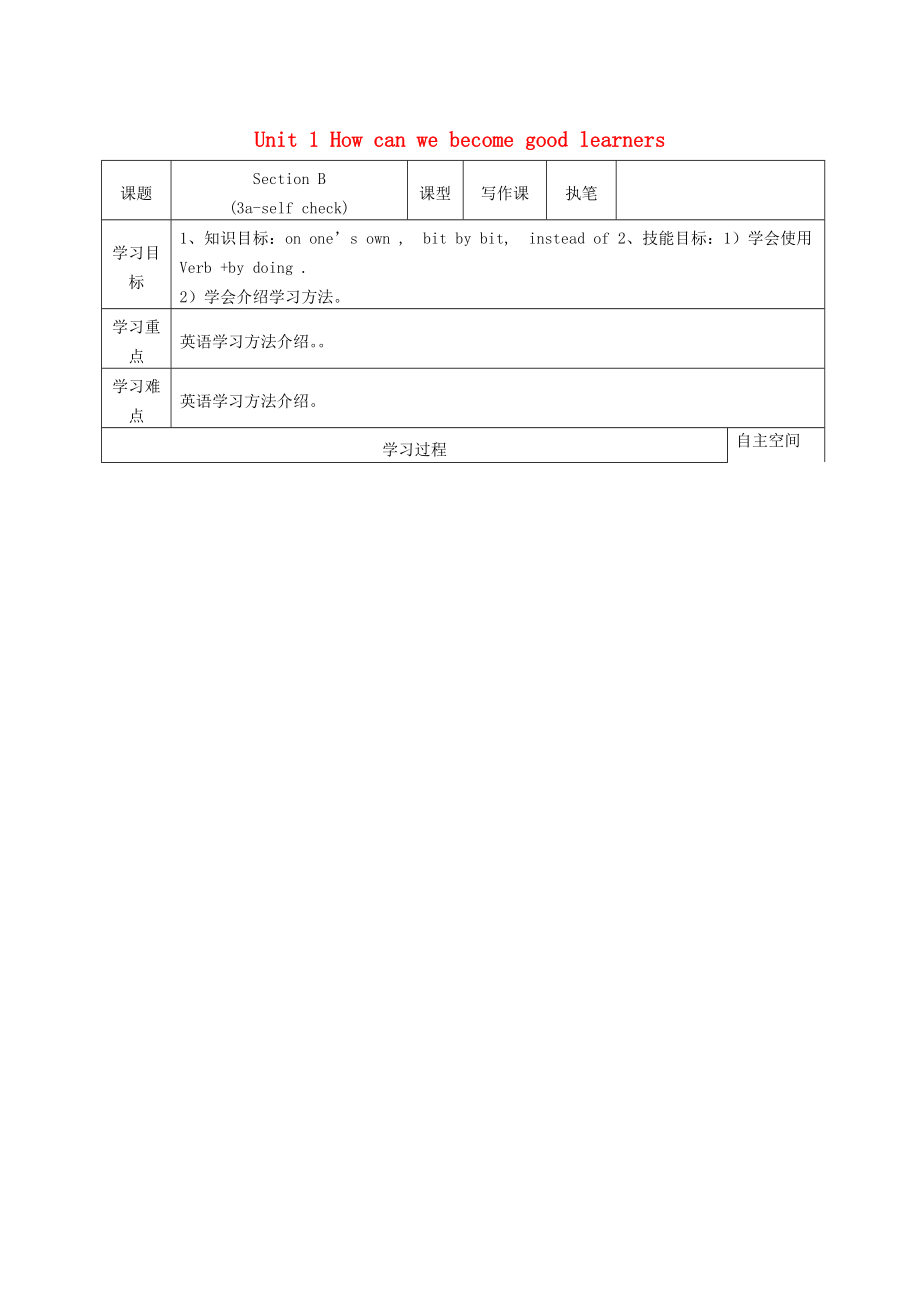《人教版九年級 Unit 1 How can we become good learners第4課時學(xué)案》由會員分享,可在線閱讀�,更多相關(guān)《人教版九年級 Unit 1 How can we become good learners第4課時學(xué)案(3頁珍藏版)》請在裝配圖網(wǎng)上搜索。
1�、 精品資料
Unit 1 How can we become good learners
課題
Section B
(3a-self check)
課型
寫作課
執(zhí)筆
學(xué)習(xí)目標(biāo)
1、知識目標(biāo):on one’s own , bit by bit, instead of 2�����、技能目標(biāo):1)學(xué)會使用Verb +by doing .
2)學(xué)會介紹學(xué)習(xí)方法。
學(xué)習(xí)重點(diǎn)
英語學(xué)習(xí)方法介紹���。����。
學(xué)習(xí)難點(diǎn)
英語學(xué)習(xí)方法介紹�����。
學(xué)習(xí)過程
自主空間
一����、【溫故知新】
翻譯下列詞組:
1是否
2、 2.依賴�,依靠
3. 害怕犯錯誤
4. 做某事的能力
5.記筆記 6. 寫下關(guān)鍵詞
7.知識來源于質(zhì)疑
8.終身的旅程 9.明智地學(xué)習(xí)
3、
10. 注意�����,關(guān)注
11. 把....和....連接或聯(lián)系起來
12. Use it or lost
13. Practice makes perfect
14. 天生具有 16.有相同特征
15. 對���。���。����。
4��、感興趣
16. 學(xué)習(xí)習(xí)慣
17. 查字典
18.通過嘗試多次和從錯誤中吸取教訓(xùn)
二�����、導(dǎo)學(xué)釋疑
任務(wù)一:同桌交流3a的答案���,然后列提綱���。
任務(wù)二:依據(jù)提綱及3a的表格內(nèi)容,恰當(dāng)運(yùn)用3b的句型��,寫一封信介紹英語學(xué)習(xí)方法����。
任務(wù)三:小組內(nèi)互相批改作文�,指出優(yōu)點(diǎn)和不足。教師點(diǎn)評�。
展示引導(dǎo)學(xué)習(xí):
1.各組展示最佳作文��,評比���。
2.Key points:
5、on one’s own , 獨(dú)自��,獨(dú)立地
譯:他現(xiàn)在自食其力���。_____________________________.
bit by bit 一點(diǎn)一點(diǎn)地 (=little by little)
譯:努力學(xué)習(xí)并一點(diǎn)一點(diǎn)地去記所有的信息而不是等到最后才學(xué)習(xí)�����。
_____________________________________________________________.:
三����、鞏固提升:
A:用方框中所給單詞的適當(dāng)形式填空��,每詞僅用一次���。
understand, success, write, listen, stay
1. Mary said th
6�、e learned English by______ to tapes.
2. I often go out with friends on weekends instead of______ at home alone.
3. He_____ in building a new house by trying many times last year.
4. You’d better find a pen pal if you don’t get much______ practice.
5. The teacher told us to read the passage once
7���、 again to have a better_____ of it.
B.By 的用法練習(xí):
1. 這個男孩正坐在窗戶邊����。The boy is sitting _________________________.
2.我能在六點(diǎn)前完成我的作業(yè)。
I can finish doing my homework ————————————����。
3.我父親堅持乘火車去北京。My father often goes to Beijing _______________.
4.你是通過看報紙學(xué)習(xí)英語的嗎����?Do you learn English _________________________
8、�?
5.順便問一下,幾點(diǎn)了���?_________________�,what time is it ?
四��、檢測反饋.根據(jù)漢語意思完成句子(詞數(shù)不限)
1.她應(yīng)該通過讀意群來提高她的閱讀速度����。
She should improve her reading speed ___________________________.
2.有些單詞我不會讀。
I can’t ___________________________________.
3.但是你是否做好取決于你的學(xué)習(xí)習(xí)慣���。
But whether or not you can do it well __________________________.
4.知識源于質(zhì)疑����。Knowledge comes from ______________.
5.當(dāng)你旅行的時候�����,應(yīng)該注意天氣��。
When you go on a trip �����,you should ____________________ the weather.
五.拓展延伸:
 人教版九年級 Unit 1 How can we become good learners第4課時學(xué)案
人教版九年級 Unit 1 How can we become good learners第4課時學(xué)案

